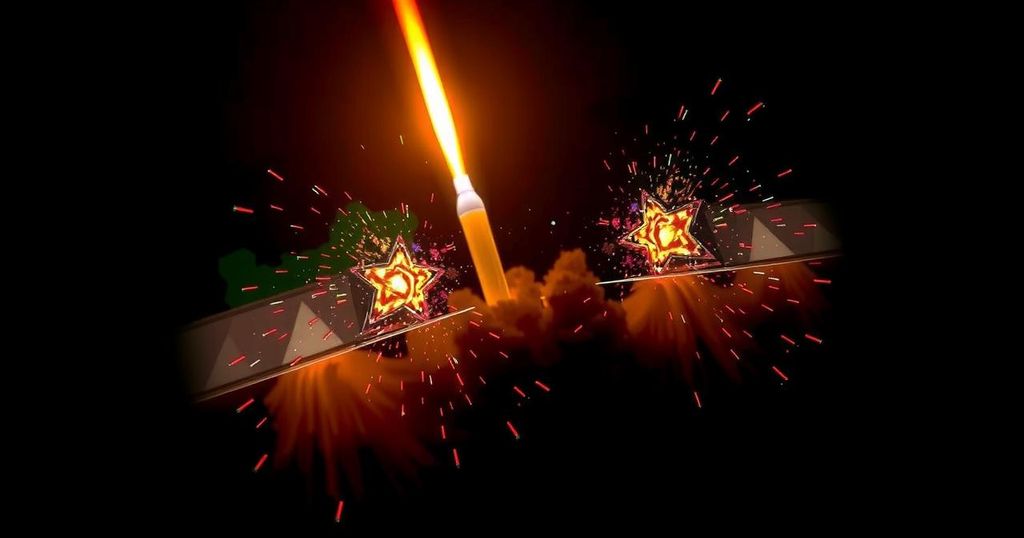Iran Issues Stern Warning to Israel Amidst Rising Military Tensions
Iran has warned Israel against retaliatory strikes following a missile barrage, amidst escalating Israeli military operations against Hezbollah in Lebanon. U.S. Defense Secretary discussed tensions with Israeli officials, while regional diplomatic efforts for peace continue. However, the situation remains critical with significant casualties on both sides and fears of a humanitarian crisis.
The situation in the Middle East remains tense as Iran’s Revolutionary Guards Commander, Hossein Salami, issued a stern warning to Israel regarding potential retaliatory strikes in response to a recent missile barrage attributed to Iran. This warning surfaced as Israel intensified its military operations against Hezbollah in Lebanon, a group backed by Tehran, in the wake of the missile attack on October 1, which was reportedly prompted by Israeli airstrikes targeting Iranian-allied militants. General Salami emphasized that any act of aggression from Israel would provoke a proportional response, stating, “We tell you (Israel) that if you commit any aggression against any point we will painfully attack the same point of yours.” He further claimed that Iran possesses the capability to breach Israel’s defenses. Compounding the concerns about escalating conflict, U.S. Defense Secretary Lloyd Austin engaged in discussions with Israeli Defense Minister Yoav Gallant, focusing on de-escalating tensions surrounding Israeli military operations in Lebanon and Gaza. Meanwhile, Iranian diplomacy was at play as Foreign Minister Abbas Araqchi visited regional states to address the situation, meeting with Egyptian President Abdel Fattah al-Sisi, who advocated for restraint to prevent the conflict from expanding. Despite calls for peace, Israeli operations showed no signs of abating; the military has vowed to retaliate against Iran for its missile attack. Israeli airstrikes continued, resulting in casualties in Gaza, with reports confirming that 11 Palestinians were killed during strikes in Gaza City. Furthermore, Israeli forces have engaged Hezbollah in Lebanon, stating they would not cease military operations until they could ensure the safety of their citizens living near the border. Israeli military actions, which have reportedly resulted in the deaths of over 2,350 individuals in the past year, along with significant community displacement, have sparked international concern about a potential humanitarian crisis. The Israeli military recently issued evacuation orders in southern Lebanon due to ongoing confrontations with Hezbollah, indicating an escalation in military engagement as violence continues to unfold. With little indication of a ceasefire on the horizon, the region remains at risk of further destabilization as Iran and Israel navigate their increasingly fraught relationship amid broader geopolitical tensions.
The backdrop of the current tensions includes a series of military confrontations between Israeli forces and Iranian allies in Lebanon and Gaza. Subsequent to a missile attack from Iran, which was purportedly a response to Israeli airstrikes, fears of an expanded military conflict have become prevalent. Israel’s military actions have escalated in scope, encompassing airstrikes in multiple countries aligned with Iran, including Syria and Yemen. Regional leaders, particularly in Egypt, are advocating for diplomatic engagement to prevent further militarization of the conflict. Overall, the recent developments illustrate the fragile nature of peace in the Middle East and the complex interplay of local and international interests.
In summary, the ongoing conflict between Israel and Iran-backed groups such as Hezbollah remains precarious. Iran’s blatant warnings of retaliation against Israel signal a climate of heightened hostility that could lead to extensive military engagement. Meanwhile, the plight of civilians in the region, exacerbated by military operations and lack of humanitarian support, underscores the urgent need for diplomatic dialogue to restore stability and peace. Without intervention, there is a serious risk of a broader regional escalation as both sides prepare for potential confrontation.
Original Source: www.jpost.com




Post Comment